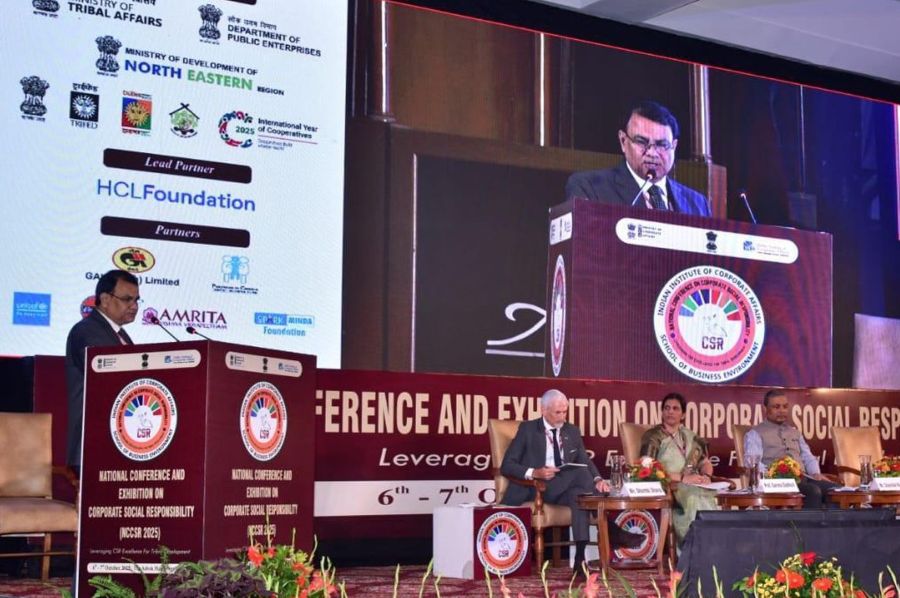New Delhi, October 08, 2025: The Indian Institute of Corporate Affairs (IICA), under the Ministry of Corporate Affairs, Government of India, concluded the National Conference and Exhibition on Leveraging CSR Excellence for Tribal Development in New Delhi on October 7, 2025. The two-day event, which marked the 2nd Annual CSR Day in India, focused on fostering collaboration, innovation, and inclusive development as key enablers of sustainable tribal welfare through Corporate Social Responsibility (CSR).
The conference brought together over 400 delegates from government, industry, academia, and civil society to deliberate on aligning CSR strategies with national priorities for tribal empowerment, livelihoods, and sustainable growth. The event also celebrated India’s tribal heritage through a cultural performance showcasing indigenous art and traditions.
Delivering the Special Address, Shri K. Moses Chalai, Secretary, Department of Public Enterprises (DPE), Government of India, urged Central Public Sector Enterprises (CPSEs) to engage more deeply with tribal communities through long-term, sustainable CSR interventions. He emphasized the importance of skill development, entrepreneurship, and digital inclusion as tools to build self-reliant tribal economies aligned with Viksit Bharat 2047.
Shri Chalai highlighted DPE guidelines on CSR spending, calling for clear objectives, measurable targets, and defined milestones to ensure tangible social and environmental outcomes. “Effective planning, monitoring, and evaluation are key to achieving measurable impact,” he said, encouraging CPSEs to collaborate with state and district administrations, corporates, and civil society organizations. “CSR should act as a catalyst for inclusive national growth,” he added.
In her Valedictory Address, Smt. Deepti Gaur Mukerjee, Secretary, Ministry of Corporate Affairs (MCA), commended IICA for curating a collaborative platform connecting policymakers, industry leaders, and community practitioners. She proposed the creation of an interactive digital platform— a revamped CSR Exchange—to facilitate convergence between government and corporate efforts, enabling project mapping, collaboration, and knowledge sharing.
Smt. Mukerjee emphasized that “community participation is central to the long-term sustainability of CSR initiatives,” urging practitioners to involve communities in project design and implementation. She also highlighted the need for “tribal leadership, self-reliance, and culturally sensitive approaches” to ensure inclusive and lasting impact.
Shri Gyaneshwar Kumar Singh, Director General & CEO, IICA, reiterated the importance of data-driven and outcome-oriented CSR that aligns with the Sustainable Development Goals (SDGs). “CSR should go beyond financial contributions to focus on delivering technological and managerial expertise, ensuring that activities take precedence over fund-based routing,” he said. He called for greater investment in research, innovation, and AI-based monitoring systems, and emphasized the need for geographically balanced and need-based CSR funding, especially in underrepresented regions such as the North East.
Mr. Bo Beiskjaer, Chief, Resource Mobilization & Partnerships, UNICEF India, underscored that CSR must evolve as a “transformational tool rather than a charitable contribution.” Linking tribal development to human and children’s rights, he emphasized that CSR should advance dignity, inclusion, and equity while delivering measurable outcomes for tribal communities.
Dr. Garima Dadhich, Head, School of Business Environment, IICA, presented a session-wise report, noting that CSR must evolve into a “strategic, data-driven, and technology-integrated tool for tribal empowerment.” She advocated for projects that respect socio-cultural contexts and support traditional crafts and GI-tagged products for long-term impact.
In her closing remarks, Dr. Dadhich extended gratitude to the Ministry of Corporate Affairs, Ministry of Tribal Affairs, Ministry of Development of North Eastern Region, Department of Public Enterprises, lead partner HCL Foundation, exhibition partner TRIFED, and other institutional partners including GAIL (India) Ltd., Partners in Change, Indian Oil Corporation Ltd., Amrita Vishwa Vidyapeetham, UNICEF, and Spark Minda Foundation.
The conference concluded with a collective call to action—urging all stakeholders to strengthen convergence, drive innovation, and make CSR a cornerstone of India’s journey toward Viksit Bharat 2047.




















.jpg)



